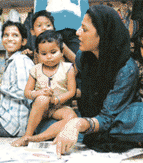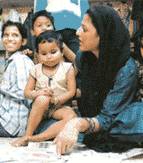
Catachresis of Culture – Power and Governance
“Culture can be a worse bomb than a nuclear bomb. While the latter acts as a deterrent, the idea of culture ignites emotions and divisions in civil society. Culture can be anything from language, ethnic identity, religion, lifestyles choices and much more…” says Dr. Kapila Vatsyayan well-known authority on Culture and my teacher for over 3 decades, to me in an informal talk at the time of Godhra riots. Since time immemorial, culture has been used by the power elite as a useful tool to enhance their own monopoly of power. Just remember what Hitler did when he used the idea of the Aryan identity. While watching the television reports on the ongoing Indian elections for the past several weeks, there is a constant reference to the division of votes based on cultural identities. Hindu, Muslim, Jats, Dalits and so on and so forth. Where is the non-partisan attitude to the idea of power and governance? But here I want to address the sector of culture in the schema of power and governance.
It also is rather ironical, that the very idea of culture which is used to gain power is relegated and dismissed in the framework of governance. Least amount of funds are allocated for this sector, and the lack of proper understanding or should I say the negligence and absence of sensitivity and comprehension of this sector has resulted in addressing the subject of culture through more than 9 central government ministries – department of culture, tribal welfare, education, textiles, tourism, child and women, minority and many more. Let us also not forget the marginalization of the skills associated with creative and cultural industries. After agriculture, the creative and cultural industries form the second largest sector of occupations in this country, and remains the sector of traditional knowledge that has sustained India. But, by adopting the Western perspectives on governance and development we have marginalized this sector. Unfortunately, several skilled people also belong to the backward castes, keeping this mind, it is important to analyze the manner in which the cultural sector has been governed. When formulating the constitution of this country the approach adopted was completely wrong. Rather than re-positioning the occupations/skills associated with this sector of people, the position taken was to address the people and their social status, which meant reservations for these large number of skilled people of this sector to facilitate them to migrate into other sectors of employment abandoning their expertise that formed a part of their essential identities. So instead of providing directions for the skills and repositioning those to compete in the emerging markets these people became displaced in the new economy. The policy makers forgot to celebrate their skills and recognize that it was these very skills that has sustained our civilization for centuries. Whether it is the carpet weaver who knows complicated mathematical combinations through a mathematical branch called beading, or the block printers who have been using organic dyes and who can compete with any chemistry specialist, or the stone workers who has made monumental edifices such as step-wells, Mughal tombs and gardens that illustrate hydraulic and civil engineering or the dancer and the percussionist who play with calculus in mental space, or the indigenous tribal communities who can educate us on the essential qualities of herbs and forest resources and all other skills that we who live in other economic spaces conveniently dismiss and use these skills and people who practice them to celebrate as the visual image and the idea of India.
In this manner the entire governance has been about de-skilling and marginalization of a large number of our skilled people who have little space in contemporary economic scenario. Our cultural and development policy has been to deskill these very people, and thrust them towards poverty. In many areas the agriculturalist may also be a cultural skilled professional, but when the displacement of farmers takes place there is no attention given to the skill which he may have other than his engagement with agriculture. All development programs focus on skilling these so called de-skilled people. On the one hand, culture remains the most powerful tool for power hungry people, and the most misused tool for dividing civil society, on the other hand the sector of culture which can rise to be one of the foremost sunrise industry remains completely fragmented and discarded in the framework of governance and development. Will the new energies that are emerging as part of the political environment also address this important sector which is made use as a major platform for addressing vote banks, will these new energies be courageous to revamp and address culture through governance in a holistic manner? Will we as a civilization finally analyze ourselves on what we were on our terms and have the openness and wisdom to balance the global with the local?
TRAVEL, DANCE, ART, CULTURAL HERITAGE OF INDIA - DR NAVINA JAFA

